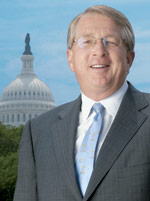With talk of cutting rates and allowing a “tax holiday” on the repatriation of overseas profits, corporate tax reform is on the agenda. s. But in the face of a $1.3 trillion annual federal deficit, any change in the corporate code probably will be “revenue neutral.” In other words, in order to lower rates, loopholes in the law will have to go.
That means there will be plenty of work for Ken Kies, the king of Gucci Gulch. The former top Republican staffer on the tax-writing House Ways and Means Committee, now head of a lobby shop called the Federal Policy Group, will have his hands full keeping taxes low for a client roster that includes Microsoft, General Electric, Caterpillar, Pfizer, Aetna, and Starwood Hotels.
“When you’re doing something as significant as tax reform, you’re almost certain to have unintended consequences—especially when we’re dealing with a very complex economy, different forms of businesses,” he says. “The only thing I can promise you with any certainty about tax reform is that it won’t be perfect. So, yeah, there’ll probably be plenty of work—it’s not going to ever go away.”
In an interview with The Fiscal Times, Kies talked about efforts to eliminate many of the tax preferences he either wrote or helped lobby into law.

1) Do your clients worry that they will get stuck with the bill for the lower rates that would come with reform?
They are quite cautious. Corporations absolutely worry that we’d offer up all this stuff like accelerated depreciation and the manufacturing credit in return for a lower rate, and all of the sudden the lawmakers say, “Well, we’ll take that but we’re not going to do your lower rate.” That’s one of the big reasons you haven’t see much in the way of the business community putting entire tax reform proposals out there.
2) What do your clients think about the need to address the deficit?
It’s not as though any corporate entity is going to go out and lead the approach to deficit reduction . . . The business community didn’t really have much to do with the debt ceiling deal. Sure, they wrote letters saying. “We’ve got to increase the debt ceiling.” That was predictable.
3) What’s holding up tax reform?
Most people don’t think, barring some lightning strike, that tax reform won’t get serious legs until 2013. You’re only going to get tax reform when you have strong presidential leadership. Tax reform is too big for one house of Congress or the other, or even one committee chairman to lead. It’s got to come from the top, and that’s the president.
4) What’s on the tax agenda for your clients now?
You’re not just going to see the business community hanging up the sign “Gone Fishing,” saying they’ll be back in 2013… A lot of business-tax provisions expire at the end of this year, so they’re looking at a potential tax increase come January 1, when provisions like the Research and Development credit expire. I’d say generally speaking they are not terribly worried about tax increases actually being enacted as part of the Super Committee or any other process because the Republicans appear to have held the line in terms of not agreeing to tax increases
5) How do the corporations justify fighting for these tax breaks in a strained budgetary environment?
If you let those tax provisions expire, it’s the equivalent of a tax increase. With the manufacturing tax credit…which functions as a 3% reduction in the tax rate to manufacturing, all you’re doing is raising our marginal rate. Lawmakers of all stripes seem to agree at this point that the corporate rate in the United States is too high relative to the rest of the world.
6) What business-related credits or subsidies are the most vulnerable targets?
The obvious most vulnerable is ethanol because it’s got a triple subsidy -- we impose tariff on imported ethanol, subsidize the production of it, and have a statute that says we have to buy a minimum amount of it. Ethanol clearly has lost some ground, and it’s clear that it will lose some of its benefits. It’s just a question of how much. After that, probably is the carried interest provision. True, it has a lot of protectors like [New York Sen.] Chuck Schumer, who isn’t an insubstantial force, but also a lot of people that believe as a matter of policy that that income shouldn’t be qualified for capital gains treatment
7) What about the oil and gas subsidies, which the president frequently pinpoints? Do you consider those at risk?
I don’t think so—there are just too many strikes against changing the system to see how exactly a tax increase could pass. If you ask the average person on the street what they think will happen if we increase taxes on oil and gas, most would say, “I think my price of gas might go up.” They’re probably right about that.
8) Would you be out of a job if the tax code were flattened or simplified?
No. In any basic income tax system that the U.S. has, there’s going to be plenty of complexity to go around. The people that walk around and say, “Oh, we can just do the income tax on a post-card,” are really naïve, in my view. There’s lots of complexity to our economy, and unless we’re going to revert back to the Stone Age where we basically barter with each other, any system that collects $2.3 trillion—and possible more going forward—is going to be complex and mean work for me.
9) Some experts have said the best we can hope for on taxes with the Super Committee is that they set targets for tax rate cuts and tax break cuts. Is that helpful?
That doesn’t accomplish anything towards the Super Committee’s objectives at all. It’s kind of like if I assign you to paint a house, but you spend most of your time working in the garden. That wasn’t the job I gave you! You were supposed to pain the house! And they are supposed to figure out a way to reduce the deficit by $1.2 trillion, not write figures on a piece of paper, which is a waste of time.


